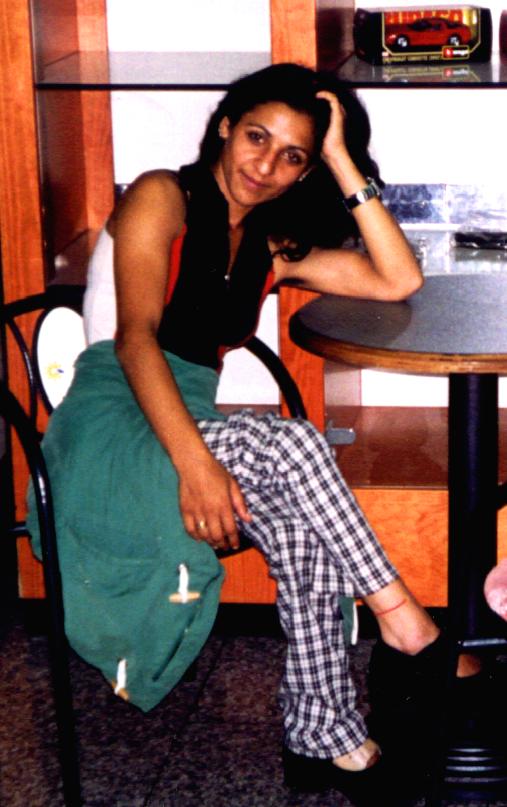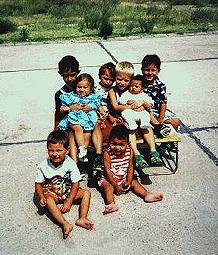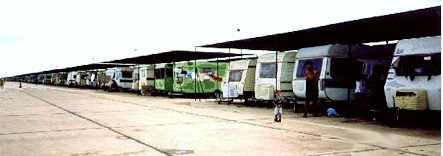Borgo Mezzanone, near Foggia in
the South-East of Italy. This is the new world, nothingness generated out
of globalization.
Blackish dry earth - wastelands of tomatoes
- tomatoes under enormous pylons whistling in the hot wind - black bodies
bent over tomatoes - the Visigoth faces of Albanians.
Italians? The police, the conductors on the
buses…
The mysterious, lonely villas which stand
out among the mountains of tomatoes certainly belong to Italians, as do
the pseudo-American shops in the middle of nowhere, all decorated with
portraits of Padre Pio.
The hungry human wolf moving at half past
four in the morning around the station of Foggia is Italian too. He circles
like a seagull, in slow concentric movements around my shoulder bag, trying
to stay constantly behind me. He seems almost to be panting from desire.
I slowly shift the bag, and he circles and circles again, for over two
hours, until he finds another victim and disappears.
The terribly sad man cleaning the station
too is Italian - with angry violence, he strikes out with his broom at
a sleeping stray dog.
 Foggia station at dawn,
August 1999
Foggia station at dawn,
August 1999
But the others - the tall black youth, dressed
in orange, with a crippled leg; toothless Rumanians, no longer young, cradling
decanters of urine-coloured wine.
Fear-filled nights, at dawn the survivors
get up to pour out yet more blood and sweat. Mysterious life on the strip
of asphalt hanging between the tomatoes, a supermarket and nothing at all,
next to the waste bins, where Italian girls go out at night looking for
foreign men.
At the station, a taxi driver smells our
need, and asks for the equivalent of thirty dollars; luckily we discover
that there is a bus which stops right near the camp. Right near... more
than a kilometer under the sun, Reska drags her "tutor", the piece of metal
holding up and cutting into her leg (almost a year later, we found out
that the tutor had been made the wrong way).
The camp where Lulzim is kept was once a
military airport, now abandoned. It is as large and empty as the surrounding
region. Camper after camper in one endless line, from horizon to horizon.
A few days before, it had hosted the Albanians, now it is hosting the Roma.
However, the carabinieri at the entrance kindly explain the difference:
the former were refugees; these, on the other hand, are illegal immigrants.
One Albanian family is still in the camp, normal people, they look like
French on holiday.
This is the first time I see so many Roma
together, a worldful of Roma. I am overwhelmed by the amount of children.
Children who seem taken care of, healthy as the circumstances allow, and
by some miracle, washed. They all want to have their picture taken, even
though they will never see it. Small children at the bare breasts feeding
them, children in the braceleted arms of women, children waiting inside
big bellies under long skirts.
 All from the same boatload...
All from the same boatload...
The camp also hosts a child who is too white
to be a Rom, he looks about ten and deeply unhappy. Actually, he is an
Albanian, is no less than fourteen, and has lost all his family. He plays
slowly and cautiously with the Rom children.
Around this world of children, high fences
prevent the suffering from pouring out and contaminating the world of tomatoes.
Nobody knows who is running the camp, which
seems to lead a life of its own. Food appears mysteriously, we come across
helpful and courteous policemen and unpleasant red cross people, liars
out of desperation. Nobody knows what is to happen to the inmates, and
some manage to escape across the tomato fields.
A week goes by. We come back and this time
I decide to hitchhike so as not to wear Reska out. Two Albanians with faces
of ancient ferocity give us a ride, on a dirty car. They ask Reska where
she comes from, she answers, from Kosovo, so they speak Albanian to her.
But her dialect is different, she starts to stammer, and I can feel all
the stress until they leave us in front of the camp. Refusing my offer
to pay for the petrol, they say to Reska in Italian "remember, never forget
the language, even after fifty years have gone by!"
A policeman with a flowery shirt, a beard,
a Neapolitan accent and a pleasant smile tells us, it is August, all his
colleagues are on holiday and nobody has yet told him what to do. So he
decides on his own to interview the refugees and grant them temporary permits,
at least so he can close the camp down.
Using an enormous old typewriter and two
fingers at a time, he writes down what the Albanian interprer says the
Roma are saying about the atrocities they suffered at the hands of the
Albanians.
The policeman asks and asks the government
what to do, and finally he does get an answer to one question from the
capital: he will be allowed to write down the interviews by hand to save
time.
He suggests that the refugees accept a permit
under the Dublin Convention. The Albanian interpreter makes an attempt
to translate; and hundreds of Roma, who have not the slightest idea of
what a Convention is or where Dublin is, let them stamp these mysterious
sheets of paper. Then they go out, into an unknown world.
Copyright © 2000
Rezijana Berisa and Miguel Martinez - You are welcome to use this article
on condition that you put the whole text of "Collateral Lives" on your
website and provide a link to http://www.kelebekler.com/
